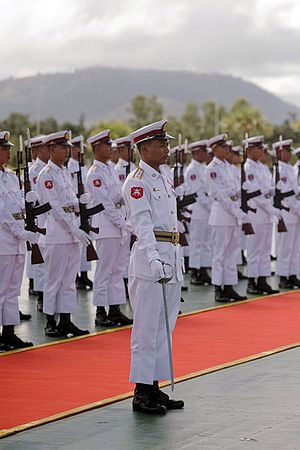The appointment of military officers to various civilian agencies is being resisted by some sectors in Myanmar.
Last August, health workers launched a black ribbon movement to protest the entry of 13 military officers into the Ministry of Health. A month later, lawyers and some judges wore yellow ribbons to denounce the deployment of military officers into the Supreme Court.
Early this week, teachers vowed to promote green ribbons as a symbol of defiance against the hiring of army officials by the education ministry. In Mandalay, electrical engineers distributed blue ribbons after vacant technological management posts in the region’s Ministry of Electric Power were reportedly given to senior military officers. Meanwhile, some geologists working in the Ministry of Energy announced the formation of a red ribbon movement to protest the appointment of army personnel in the agency.
Authors and poets who are wary of the creeping militarization of civilian bodies in Myanmar have recently initiated a purple ribbon campaign aimed at stopping the continued nomination of active and retired army officials in various government agencies.
The ribbon movement began in the health sector. The announcement that senior army officials with no medical experience would occupy top positions in the Ministry of Health was widely criticized by doctors and other health professionals. Two days after this was reported in the news, a black ribbon movement emerged enjoining medical professionals to oppose the “military infiltration” of the ministry.
A Facebook page was set up, which quickly became popular. Organizers of the campaign immediately clarified that they are not backed by any political party: “This movement is not initiated, influenced, or encouraged by any political organization. We are simply opposing the dictatorial decision through a non-violent movement,” they said.
They also appealed for public support: “Anyone who would like to oppose the actions of the repressive military government who ignores human rights and the democratic norms of ruling the country based on the aspirations of the people can take part in this movement.”
Responding to the criticism, the ministry vowed that it will no longer accept further nominations from the army.
Inspired by the social media success of the black ribbon movement, a group of lawyers urged the public to tie a yellow ribbon on every court and to “rise up against the militarization of the judiciary.”
High Court lawyer Kyaw Myo Thu explained why his peers are protesting the appointment of former army officers in the judiciary: “We, the lawyers, are also acutely aware that having military superiors influencing from above can disrupt the ability of a civilian judiciary to make decisions freely.”
The campaign reached the townships of Pyinmana, Lewe, Tatkone, Zabuthiri, Ottarathiri, Pobbathiri, Zeyarthiri, and Nay Pyi Taw territorial council. In Pyay, a judge conducted a solo protest against the appointment of army officers in the Supreme Court.
This week, during the World Teachers’ Day celebration on October 5, the Myanmar Teachers’ Union bemoaned the lack of improvements in the education sector. Further, the group also criticized the practice of allotting high-level positions in the education ministry to retired army officers.
“We have nothing to say about those ex-military officers who have already been appointed to administer the education sector but we hope that no more ex-military officers will be appointed in the future,” a teacher said during the launching of the green ribbon campaign.
That army officials are rewarded with juicy appointments in Myanmar’s civilian sector is no longer surprising news. After five decades of military dictatorship, the country’s democratic transition continues to encounter formidable challenges. It seems that old practices die hard.
But the ribbon movements surprised many because these were spearheaded by ordinary citizens who resisted the prerogative of the army to dominate the leadership of various government agencies.
In the case of the black ribbon campaign, it was warmly received by the public, which forced the government to reconsider its appointments. The campaign didn’t dislodge the privilege of the military. But it revealed the insincerity of the military-backed government, which has declared its commitment to pursue democratic reforms.
The world is closely monitoring how Myanmar will conduct its election next month, hoping that it would lead to a more open and inclusive Burmese democracy. But the ribbon campaigns remind us that in order to expand civilian participation in the government, election reforms must be accompanied by bureaucratic adjustments.
On a positive note, the ribbon movements highlight the rise of new citizen groups and formations which are critical of the pronouncements of the government. They pose no threat to the establishment. But they could inspire more people to resist not just the militarization of civilian agencies, but also other privileges that the army has established to maintain its hegemony in Myanmar society.

































